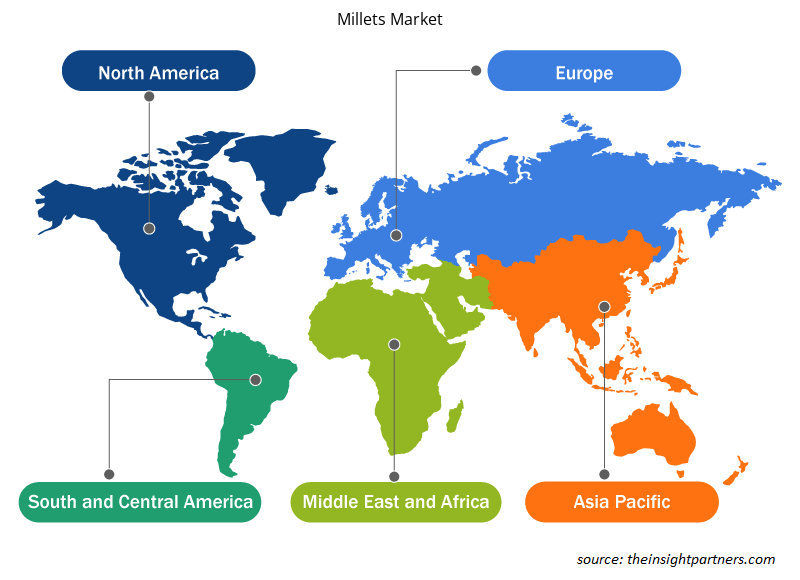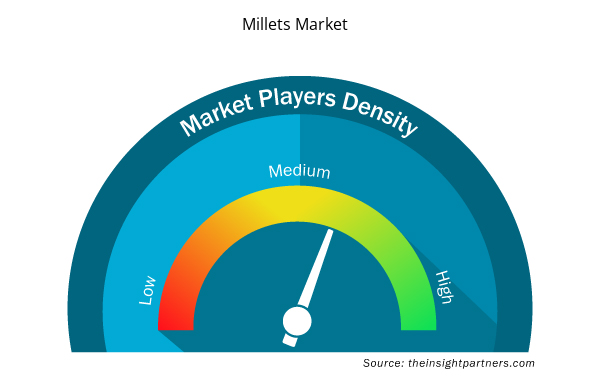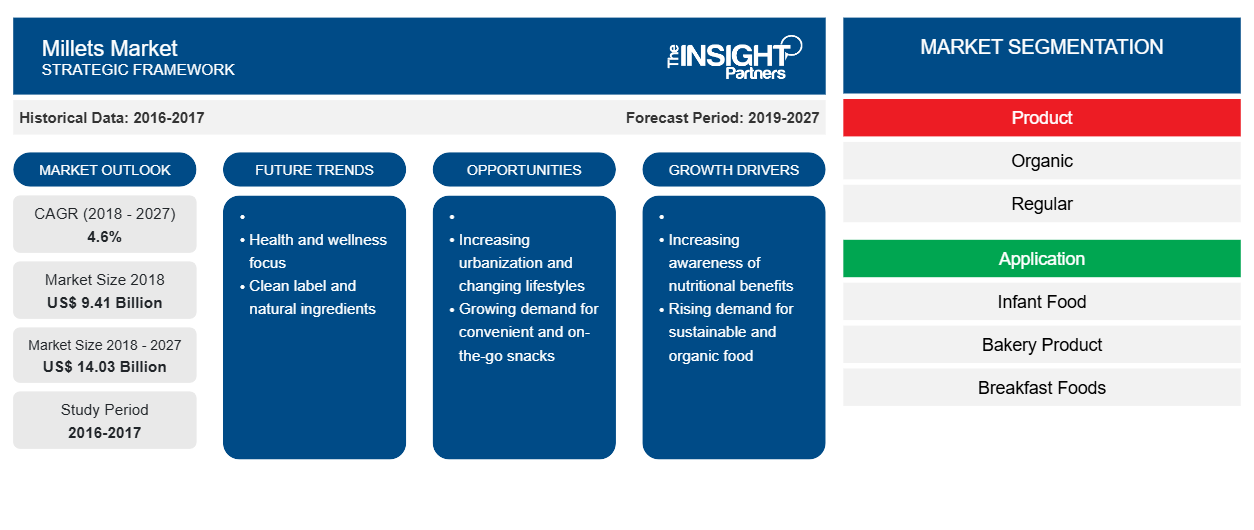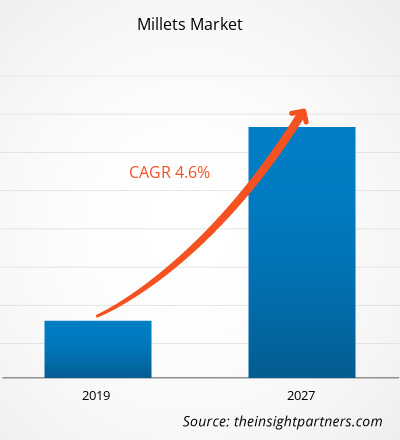2018 年小米市场价值为 94.078 亿美元,预计 2019 年至 2027 年的复合年增长率为 4.6%,到 2027 年达到 140.263 亿美元。
小米是一种小粒禾本科植物,在世界各地广泛种植,作为饲料和人类食物的谷类作物或谷物。世界各地种植着各种类型的小米作物,例如高粱、小米、珍珠粟、稷、黍和小米。这些作物生长在半干旱的热带地区,因为它们本质上具有很强的耐旱性。几个世纪以来,小米一直是亚洲和非洲的主要主食。小米不含麸质,富含铜、镁、磷和锰等营养成分。小米中丰富的营养成分有助于维持健康的生活。小米是患有糖尿病和心脏病等慢性疾病的人的理想食物。小米富含纤维,有助于消化并能缓解肠道问题。经常食用小米有助于预防胃肠道疾病和其他与肾脏和肝脏有关的疾病。根据用途,小米市场分为婴儿食品、烘焙产品、早餐食品、饮料、饲料等。2018 年,早餐食品占据了整个市场份额的 32.1%,占据了主导地位。早餐食品领域最大的份额归因于注重健康的消费者对富含纤维和无麸质食品的需求不断增加。
预计在预测期内,欧洲的复合年增长率最高,为 5.4%。多家国内外公司在北美站稳了脚跟。欧洲西部的生活水平较高,人们的收入水平也较高。它是欧洲大陆最富裕的地区之一,人均国内生产总值 (GDP) 高于其他地区。欧洲消费者的偏好各不相同,反映了不同国家的经济状况、烹饪习惯和消费习惯。欧洲是一个成熟的小米市场。
定制此报告以满足您的需求
您可以免费定制任何报告,包括本报告的部分内容、国家级分析、Excel 数据包,以及为初创企业和大学提供优惠和折扣
- 获取此报告的关键市场趋势。这个免费样品将包括数据分析,从市场趋势到估计和预测。
COVID 19 对全球小米市场的影响
COVID 19 疫情于 2019 年 12 月首先在中国武汉爆发,此后迅速蔓延至全球。截至 2020 年 3 月,中国、意大利、伊朗、西班牙、韩国、法国、德国和美国是确诊病例和死亡人数最多的国家。由于封锁、旅行禁令和企业停业,COVID-19 疫情已影响到各国的经济和行业。全球化学和材料行业是受疫情影响最大的行业之一,供应链中断、技术活动取消和办公室关闭等情况严重。例如,中国是全球制造业中心,也是各行业最大的原材料供应国。由于工厂关闭、供应链受阻和世界经济下滑,COVID-19 导致的整体市场崩溃也影响了小米市场的增长。
小米的健康益处让全球小米市场青睐不已
食用小米与治疗各种疾病有关。例如,小米中含有的高纤维水平可降低低密度脂蛋白或坏胆固醇,并增加高密度脂蛋白或好胆固醇。此外,小米的高纤维含量可降低血压,从而最大限度地降低心脏病发作的风险。同样,小米中的镁含量有助于改善胰岛素敏感性和预防 2 型糖尿病。小米富含铁和叶酸,可预防贫血并维持体内适当的血红蛋白水平。此外,它还可以避免其他疾病,如肥胖和心血管问题——心脏病发作、冠状动脉疾病和心律失常。由于小米营养含量高,小米在营养产品和婴儿食品中的应用正在以惊人的速度增长。因此,消费者对经常食用小米的健康益处的认识不断提高,预计将推动小米市场的增长。
基于应用的洞察
根据用途,小米市场可分为婴儿食品、烘焙食品、早餐食品、饮料、饲料和其他。早餐食品占全球小米市场的最大份额,而烘焙食品预计在预测期内将以更高的复合年增长率增长。根据《质地研究杂志》发表的研究,用 60% 的小米替代小麦粉可以提高松饼的营养价值或质地。小米粉,尤其是白苔麸和黄小米,正在西方国家迅速生产,作为制作面食和烘焙食品的无麸质面粉。在非洲,传统小米食品的方便型小规模生产正在不断扩大。这些产品迎合了越来越多愿意为小米支付高价的城市中产阶级消费者的需求。
基于产品的洞察
根据产品类型,小米市场分为有机小米和普通小米。普通小米占据全球小米市场的最大份额,而有机小米预计在预测期内将实现最快的增长率。普通小米或无机小米是使用杀虫剂、农药和其他现代农业技术生产的。普通小米富含淀粉,蛋白质含量与玉米或小麦相当,维生素 B 含量高,广泛用于食品工业。尽管小米营养价值高,但受到的关注却不如主要谷物。小米在许多非洲和亚洲国家的粮食安全和经济中发挥着重要作用。种植小米可以保持旱地的生产力,确保未来的粮食和营养安全。小米可以滋润结肠,防止人体便秘。
基于分销渠道的洞察
根据分销渠道,小米市场分为超市和大卖场、杂货店、网店和其他。其他部分占小米市场的最大份额,而预计在线部分在预测期内将实现最快增长率。小米的其他分销渠道包括直销、专卖店和批发商。直销渠道在生产商和食品加工公司之间建立了联系,也在消费者和小米产品生产商之间建立了联系。专卖店在小米销售方面的收入较低。许多生产商选择通过零售店销售小米,因为小米的实物供应可以建立消费者的信心。当当地市场生产商无法以满意的价格出售小米产品时,他们会将产品卖到遥远的市场。
小米市场区域洞察
Insight Partners 的分析师已详细解释了预测期内影响小米市场的区域趋势和因素。本节还讨论了北美、欧洲、亚太地区、中东和非洲以及南美和中美洲的小米市场细分和地理位置。

- 获取小米市场的区域特定数据
小米市场报告范围
| 报告属性 | 细节 |
|---|---|
| 2018 年市场规模 | 94.1亿美元 |
| 2027 年市场规模 | 140.3亿美元 |
| 全球复合年增长率(2018 - 2027) | 4.6% |
| 史料 | 2016-2017 |
| 预测期 | 2019-2027 |
| 涵盖的领域 | 按产品
|
| 覆盖地区和国家 | 北美
|
| 市场领导者和主要公司简介 |
|
小米市场参与者密度:了解其对商业动态的影响
小米市场正在快速增长,这得益于终端用户需求的不断增长,这些需求源于消费者偏好的不断变化、技术进步以及对产品优势的认识不断提高等因素。随着需求的增加,企业正在扩大其产品范围,进行创新以满足消费者的需求,并利用新兴趋势,从而进一步推动市场增长。
市场参与者密度是指在特定市场或行业内运营的企业或公司的分布情况。它表明在给定市场空间中,相对于其规模或总市场价值,有多少竞争对手(市场参与者)存在。
在小米市场运营的主要公司有:
- 陀罗尼法门有限公司
- 达马普里区小杂粮农民生产有限公司
- 地球产品私人有限公司
- 贾纳达尼亚
- 有机食品
免责声明:上面列出的公司没有按照任何特定顺序排列。

- 获取小米市场顶级关键参与者概览
报告亮点
- 全球小米市场的进步行业趋势有助于参与者制定有效的长期战略
- 发达市场和发展中市场采用的业务增长战略
- 2017 年至 2027 年全球小米市场定量分析
- 各行业全球小米需求量估计
- PEST 分析可说明行业内买家和供应商预测市场增长的有效性
- 了解竞争激烈的市场形势和全球小米需求的最新发展
- 市场趋势和前景以及推动和抑制全球小米市场增长的因素
- 通过了解支撑全球小米市场增长商业利益的战略来进行决策过程
- 全球小米市场各市场节点规模
- 全球小米市场的详细概述和细分,以及行业动态
- 全球各地区小米市场规模及增长机遇
全球小米市场 – 按产品分类
- 有机的
- 常规的
全球小米市场 – 按应用分类
- 婴儿食品
- 烘焙食品
- 早餐食品
- 饮料
- 饲料
- 其他的
全球小米市场 – 按分销渠道
- 超市和大卖场
- 杂货店
- 在线商店
- 其他的
公司简介
- 有机食品
- 地球产品私人有限公司
- 西姆拉山奉献私人有限公司
- Pristine Organics 私人有限公司
- 斯雷斯塔天然生物产品列兵。有限公司
- 陀罗尼法师有限公司
- 达马普里区小杂粮农民生产有限公司
- 贾纳达尼亚
- Sahaja Samrudha 有机生产有限公司 (SSOPCL)
- Viruthai 小米农民生产有限公司 (VMFPCL)
- 历史分析(2 年)、基准年、预测(7 年)及复合年增长率
- PEST 和 SWOT 分析
- 市场规模价值/数量 - 全球、区域、国家
- 行业和竞争格局
- Excel 数据集


- Adaptive Traffic Control System Market
- Hair Extensions Market
- Aesthetic Medical Devices Market
- Authentication and Brand Protection Market
- Pressure Vessel Composite Materials Market
- Rugged Phones Market
- Workwear Market
- Smart Parking Market
- Customer Care BPO Market
- Semiconductor Metrology and Inspection Market

Report Coverage
Revenue forecast, Company Analysis, Industry landscape, Growth factors, and Trends

Segment Covered
This text is related
to segments covered.

Regional Scope
North America, Europe, Asia Pacific, Middle East & Africa, South & Central America

Country Scope
This text is related
to country scope.
常见问题
Just Organik, Earthon Products Pvt Ltd., Shimla Hills Offerings Pvt. Ltd., Pristine Organics Pvt Ltd., Sresta Natural Bioproducts Pvt. Ltd., Dharani FaMCooP Ltd., Dharmapuri District Minor Millet Farmer Producer Company Limited, Janadhanya, Sahaja Samrudha Organic Producer Company Ltd (SSOPCL), Viruthai Millets Farmer Producer Company Ltd. (VMFPCL) are among the major players in the global millets market.
As per the study published in journal of Texture studies, the replacement of wheat flour by 60 percent finger millets increases the nutritive value or texture of muffins. Millets flours especially white teff and proso millets are being rapidly produced in western countries, as gluten free flours for the production of pasta and baked goods.
In 2018,the millets market was predominant in Asia Pacific at the global level. Rising awareness about the health benefits and increasing millets usage in foodstuff is propelling the market growth in the region. Rising expenditure towards research and development activities, to diversify the application base of millets has also led to market growth in the Asia Pacific region.
Trends and growth analysis reports related to Food and Beverages : READ MORE..
The List of Companies - Global Millets Market
- Dharani FaM CooP Ltd
- Dharmapuri District Minor Millet Farmer Producer Company Limited
- Earthon Products Pvt Ltd
- Janadhanya
- Just Organik
- Pristine Organics Pvt Ltd.
- Sahaja Samrudha Organic Producer Company Ltd (SSOPCL)
- Shimla Hills Offerings Pvt. Ltd
- Sresta Natural Bioproducts Pvt. Ltd.
- Viruthai Millets Farmer Producer Company Ltd. (VMFPCL)
The Insight Partners performs research in 4 major stages: Data Collection & Secondary Research, Primary Research, Data Analysis and Data Triangulation & Final Review.
- Data Collection and Secondary Research:
As a market research and consulting firm operating from a decade, we have published and advised several client across the globe. First step for any study will start with an assessment of currently available data and insights from existing reports. Further, historical and current market information is collected from Investor Presentations, Annual Reports, SEC Filings, etc., and other information related to company’s performance and market positioning are gathered from Paid Databases (Factiva, Hoovers, and Reuters) and various other publications available in public domain.
Several associations trade associates, technical forums, institutes, societies and organization are accessed to gain technical as well as market related insights through their publications such as research papers, blogs and press releases related to the studies are referred to get cues about the market. Further, white papers, journals, magazines, and other news articles published in last 3 years are scrutinized and analyzed to understand the current market trends.
- Primary Research:
The primarily interview analysis comprise of data obtained from industry participants interview and answers to survey questions gathered by in-house primary team.
For primary research, interviews are conducted with industry experts/CEOs/Marketing Managers/VPs/Subject Matter Experts from both demand and supply side to get a 360-degree view of the market. The primary team conducts several interviews based on the complexity of the markets to understand the various market trends and dynamics which makes research more credible and precise.
A typical research interview fulfils the following functions:
- Provides first-hand information on the market size, market trends, growth trends, competitive landscape, and outlook
- Validates and strengthens in-house secondary research findings
- Develops the analysis team’s expertise and market understanding
Primary research involves email interactions and telephone interviews for each market, category, segment, and sub-segment across geographies. The participants who typically take part in such a process include, but are not limited to:
- Industry participants: VPs, business development managers, market intelligence managers and national sales managers
- Outside experts: Valuation experts, research analysts and key opinion leaders specializing in the electronics and semiconductor industry.
Below is the breakup of our primary respondents by company, designation, and region:

Once we receive the confirmation from primary research sources or primary respondents, we finalize the base year market estimation and forecast the data as per the macroeconomic and microeconomic factors assessed during data collection.
- Data Analysis:
Once data is validated through both secondary as well as primary respondents, we finalize the market estimations by hypothesis formulation and factor analysis at regional and country level.
- Macro-Economic Factor Analysis:
We analyse macroeconomic indicators such the gross domestic product (GDP), increase in the demand for goods and services across industries, technological advancement, regional economic growth, governmental policies, the influence of COVID-19, PEST analysis, and other aspects. This analysis aids in setting benchmarks for various nations/regions and approximating market splits. Additionally, the general trend of the aforementioned components aid in determining the market's development possibilities.
- Country Level Data:
Various factors that are especially aligned to the country are taken into account to determine the market size for a certain area and country, including the presence of vendors, such as headquarters and offices, the country's GDP, demand patterns, and industry growth. To comprehend the market dynamics for the nation, a number of growth variables, inhibitors, application areas, and current market trends are researched. The aforementioned elements aid in determining the country's overall market's growth potential.
- Company Profile:
The “Table of Contents” is formulated by listing and analyzing more than 25 - 30 companies operating in the market ecosystem across geographies. However, we profile only 10 companies as a standard practice in our syndicate reports. These 10 companies comprise leading, emerging, and regional players. Nonetheless, our analysis is not restricted to the 10 listed companies, we also analyze other companies present in the market to develop a holistic view and understand the prevailing trends. The “Company Profiles” section in the report covers key facts, business description, products & services, financial information, SWOT analysis, and key developments. The financial information presented is extracted from the annual reports and official documents of the publicly listed companies. Upon collecting the information for the sections of respective companies, we verify them via various primary sources and then compile the data in respective company profiles. The company level information helps us in deriving the base number as well as in forecasting the market size.
- Developing Base Number:
Aggregation of sales statistics (2020-2022) and macro-economic factor, and other secondary and primary research insights are utilized to arrive at base number and related market shares for 2022. The data gaps are identified in this step and relevant market data is analyzed, collected from paid primary interviews or databases. On finalizing the base year market size, forecasts are developed on the basis of macro-economic, industry and market growth factors and company level analysis.
- Data Triangulation and Final Review:
The market findings and base year market size calculations are validated from supply as well as demand side. Demand side validations are based on macro-economic factor analysis and benchmarks for respective regions and countries. In case of supply side validations, revenues of major companies are estimated (in case not available) based on industry benchmark, approximate number of employees, product portfolio, and primary interviews revenues are gathered. Further revenue from target product/service segment is assessed to avoid overshooting of market statistics. In case of heavy deviations between supply and demand side values, all thes steps are repeated to achieve synchronization.
We follow an iterative model, wherein we share our research findings with Subject Matter Experts (SME’s) and Key Opinion Leaders (KOLs) until consensus view of the market is not formulated – this model negates any drastic deviation in the opinions of experts. Only validated and universally acceptable research findings are quoted in our reports.
We have important check points that we use to validate our research findings – which we call – data triangulation, where we validate the information, we generate from secondary sources with primary interviews and then we re-validate with our internal data bases and Subject matter experts. This comprehensive model enables us to deliver high quality, reliable data in shortest possible time.


 获取此报告的免费样本
获取此报告的免费样本